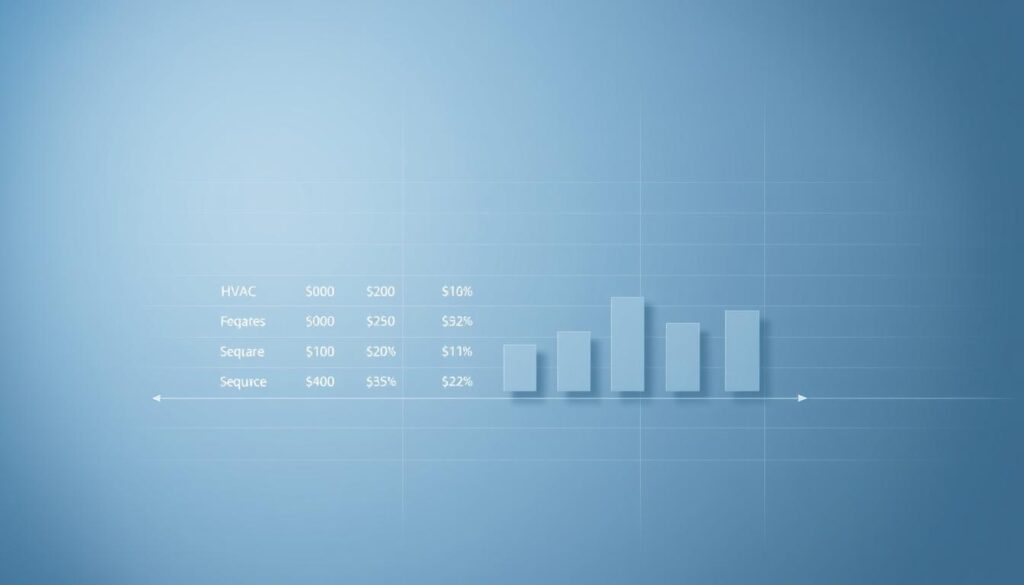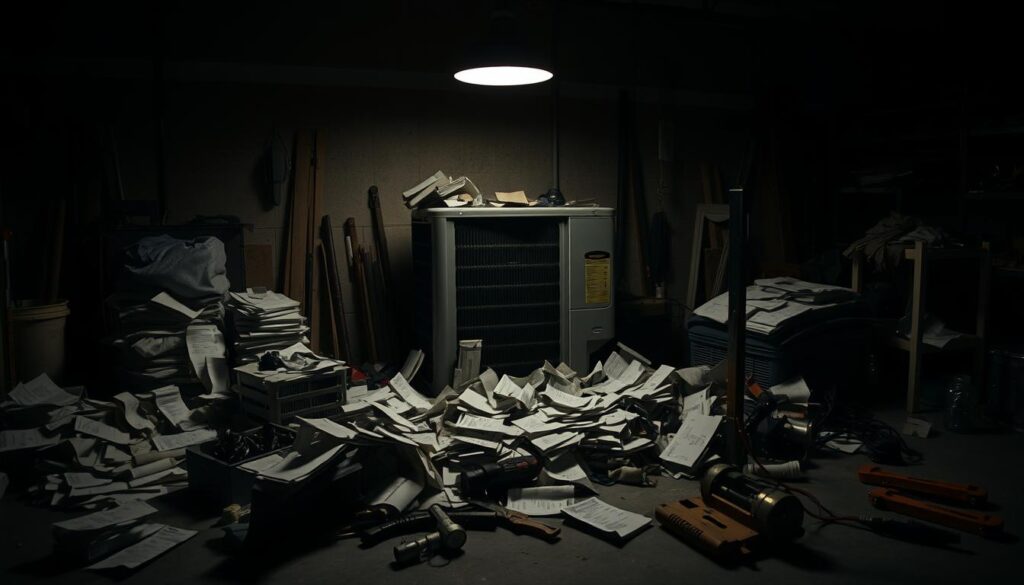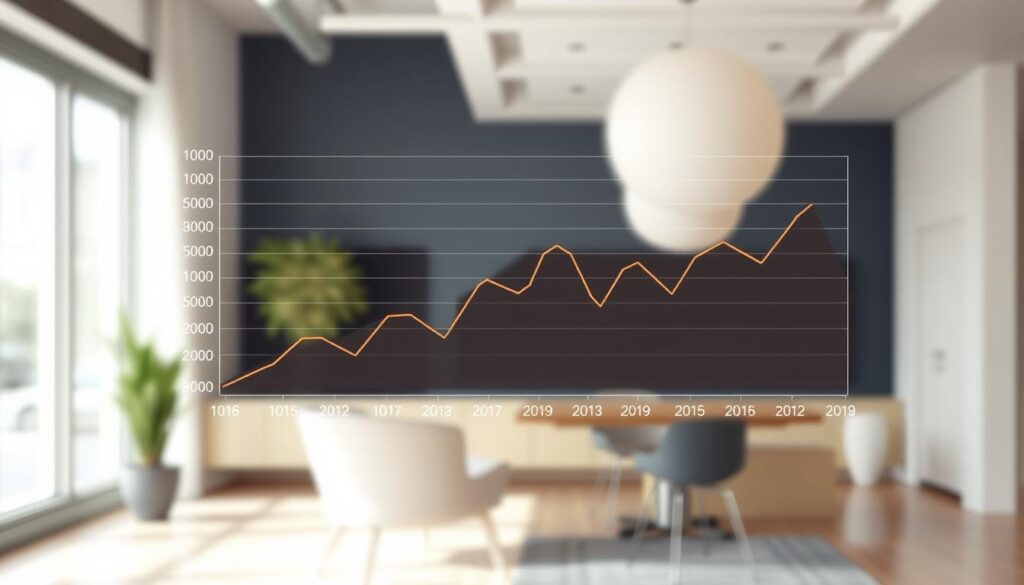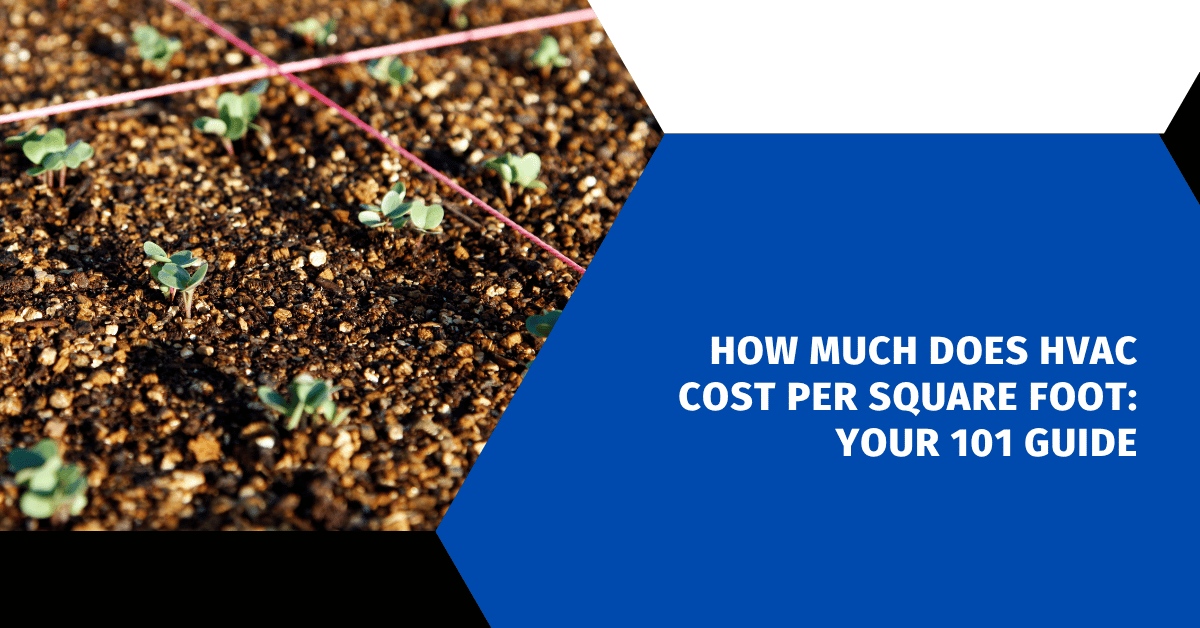Affiliate Disclosure
HVAC Guide Guys is a participant in the Amazon Services LLC Associates Program, an affiliate advertising program designed to provide a means for sites to earn advertising fees by advertising and linking to Amazon.
How Much Does HVAC Cost Per Square Foot? Are you fed up with high energy bills? Wondering how much your home’s comfort really costs? Knowing the true cost of HVAC installation can change how you think about home climate control. The average HVAC cost per square foot is more than just a number. It’s a smart investment in your home’s comfort and value.

Understanding HVAC pricing can be tough. In 2024, homeowners and property managers want to know the cost per square foot. Installation costs usually fall between $3.50 to $7 per square foot. This guide will help you understand the key factors that affect your HVAC cost. It will help you make a smart choice.
Key Takeaways
- HVAC installation costs range from $6,000 to $12,500
- Pricing varies by system type, home size, and regional factors
- Energy efficiency can significantly impact long-term expenses
- Professional assessment is key for accurate cost estimation
- Think about both upfront and operational costs when budgeting
Table of Contents
Understanding HVAC System Basics and Cost Factors
When looking at hvac system pricing, it’s key to know the basics. Your HVAC system is a big deal for home comfort and saving energy. It’s more than just controlling the temperature.
Different HVAC setups can change your installation cost a lot. Each system has its own benefits and prices, based on what your home needs.
Popular HVAC System Types
- Central Air Conditioning: Traditional whole-home cooling system
- Heat Pumps: Versatile heating and cooling solution
- Ductless Mini-Split Systems: Flexible zone-based temperature control
- Furnace and AC Combination: Complete heating and cooling package
Critical Cost-Determining Components
Several key factors affect your HVAC system’s price:
- System capacity and square footage coverage
- Energy efficiency ratings (SEER)
- Brand reputation and quality
- Installation complexity
Regional Price Considerations
Your location affects hvac system pricing a lot. Climate, local labor rates, and energy costs vary by state and city.
Knowing these basics helps you choose the right HVAC for your home.
Average HVAC Installation Costs in 2024
When planning to upgrade your home’s comfort, knowing the average HVAC installation cost is key. In 2024, expect to spend between $6,000 and $12,000 for a new HVAC system. The average cost is about $7,500 for both heating and cooling.
Your final cost will depend on several important factors:
- System type and complexity
- Home square footage
- Energy efficiency ratings
- Local labor rates
- Equipment brand and quality
Different HVAC systems have different prices:
- Central Air Conditioner: $3,500 – $7,500
- Heat Pump System: $4,000 – $8,000
- Furnace: $2,500 – $6,000
- Complete HVAC System: $6,000 – $12,000
Professional installation costs 30-40% of the total. A high-quality system can save energy and improve comfort over time.
Explore Our HVAC Shop
Looking for top-rated HVAC tools, parts, and accessories? Visit our shop and find the perfect solution for your needs.
Visit the ShopHow Much Does HVAC Cost Per Square Foot
Knowing the cost of HVAC installation per square foot is key for homeowners and property managers. The price can change a lot based on different factors. It’s important to understand what affects hvac square footage pricing.
When figuring out the cost per square foot, several key factors come into play:
- Property type (residential vs. commercial)
- System complexity
- Local climate conditions
- Energy efficiency requirements
Residential Cost Breakdown
For homes, HVAC installation costs between $3.50 and $7 per square foot. This includes the cost of equipment, materials, and labor. Smaller homes might cost more per square foot because of fixed costs.
| Home Size | Average HVAC Cost | Cost per Square Foot |
|---|---|---|
| 1,000 sq ft | $3,500 – $7,000 | $3.50 – $7.00 |
| 1,500 sq ft | $5,250 – $10,500 | $3.50 – $7.00 |
| 2,000 sq ft | $7,000 – $14,000 | $3.50 – $7.00 |
Commercial Property Considerations
Commercial HVAC installations need more complex systems, which can raise the cost per square foot. Building use, occupancy, and special equipment can also affect the price.
Cost Calculation Methods
HVAC experts use several ways to figure out costs:
- Square footage assessment
- BTU (British Thermal Unit) requirements
- Existing ductwork evaluation
- Energy efficiency goals
Pro tip: Always get multiple quotes and compare detailed breakdowns to understand your specific hvac square footage pricing.
While per-square-foot pricing is a good starting point, your project might have special needs that change the final cost.
System Size and Home Square Footage Correlation
Choosing the right HVAC system size is key for comfort and saving on costs. Your home’s size is a big factor in picking the right system. Experts use a detailed method to find the best match for your home’s needs.
HVAC system size is measured in tons, which shows cooling power. Here’s a quick guide to system sizing:
- 1.5-ton system: Good for homes up to 1,000 square feet
- 2-ton system: Best for 1,000-1,500 square feet
- 3-ton system: Ideal for 1,500-2,000 square feet
- 4-ton system: Recommended for 2,000-2,500 square feet
Choosing the wrong size can cause big issues. A system that’s too small will have trouble cooling your home, raising energy bills. A system that’s too big wastes energy and can’t cool evenly. HVAC pros use a detailed method called Manual J Load Calculation to find the perfect size for your home.
Pro tip: Always consult a professional to get an accurate system size recommendation for your specific home layout and local climate conditions.
Things that affect HVAC system sizing include:
- Total square footage
- Home insulation quality
- Number of windows and doors
- Local climate conditions
- Ceiling height
Spending time to pick the right HVAC system size saves money in the long run. A system that fits perfectly keeps your home comfortable and efficient.
Explore Our HVAC Shop
Looking for top-rated HVAC tools, parts, and accessories? Visit our shop and find the perfect solution for your needs.
Visit the ShopEnergy Efficiency and Long-term Cost Benefits
When thinking about replacing your HVAC, knowing about energy efficiency is key. Your HVAC system is a big investment. It affects your costs now and in the future.
How efficient your HVAC is matters a lot. It affects your monthly bills and how well your system works. A good hvac cost estimator will show you the real value of your investment.
SEER Ratings Explained
SEER (Seasonal Energy Efficiency Ratio) ratings are important. They tell you how well your system works. The higher the SEER rating, the more efficient it is:
- Minimum 14 SEER required in Northern states
- Minimum 15 SEER recommended in Southern states
- Premium systems reach up to 26 SEER
“Investing in high-efficiency HVAC systems can reduce energy consumption by up to 40%.” – Energy Star Research
Annual Operating Costs
Your yearly costs depend on a few things. These include how efficient your system is, local energy prices, and how much you use it. Even though high-efficiency systems might cost more at first, they save a lot of money later on.
Return on Investment Analysis
Doing a return on investment analysis is smart. It shows the long-term money savings of an energy-efficient HVAC. Think about:
- Initial installation costs
- Projected energy savings
- Possible tax credits and rebates
- Expected system lifespan
Pro tip: Talk to a professional HVAC technician for a personalized efficiency and cost check for your home.
Hidden Costs and Additional Expenses

When you’re planning to get a new HVAC unit, it’s important to think about hidden costs. These can really add up and surprise you. Many people don’t realize how much extra money they might need for their HVAC installation.
There are several areas where unexpected costs can pop up:
- Ductwork modifications
- Electrical system upgrades
- Permit and inspection fees
- Potential structural changes
- Asbestos or hazardous material removal
Your home’s age and condition can greatly affect the cost. Older homes might need new ductwork or electrical upgrades. These changes can increase your costs by thousands of dollars.
Local building codes also play a role in the cost. Permits can cost anywhere from $250 to $1,000. HVAC experts can guide you through these extra costs.
“Always budget 10-15% extra for unexpected installation costs to avoid financial stress.”
Planning ahead can help you avoid surprises. Ask for detailed estimates that include all possible extra costs. This way, you’ll know exactly what you’re getting into.
Explore Our HVAC Shop
Looking for top-rated HVAC tools, parts, and accessories? Visit our shop and find the perfect solution for your needs.
Visit the ShopInstallation and Labor Cost Factors
Understanding hvac installation costs is key to choosing the right home comfort system. Labor costs are a big part of the total cost for your HVAC project.
When planning an HVAC installation, several factors affect your total expenses. Cost estimator tools can help, but expert advice is even more valuable.
Professional vs DIY Considerations
- Professional installation means expert precision and warranty protection
- DIY can save on labor but might compromise system performance
- For complex installations, professional services are a must
Regional Labor Rate Variations
| Region | Average Hourly Rate | Complexity Factor |
|---|---|---|
| Northeast | $75-$100 | High |
| Midwest | $50-$75 | Medium |
| Southwest | $60-$85 | Medium |
| West Coast | $80-$110 | High |
Timeline and Complexity Factors
Your HVAC installation timeline is influenced by several key elements. Residential jobs usually take 1-3 days, while commercial ones can last weeks. Complexity factors include:
- Home square footage
- Existing ductwork condition
- System type and efficiency rating
- Structural modifications needed
Choosing the right professionals is critical for your hvac installation cost. Always ask for detailed quotes and check contractor credentials before deciding.
Comparing Different HVAC Brands and Models
Choosing the right HVAC system is a big decision. The cost can change a lot based on the brand and features. Top brands like Carrier, Trane, and Lennox have different benefits for your home.
When looking at new HVAC costs, think about these important points:
- Energy efficiency ratings
- Warranty coverage
- Performance capabilities
- Technology integration
Carrier is known for being reliable, with prices from $3,500 to $7,500. Trane offers high-tech models priced between $4,000 and $8,000. Lennox has high-efficiency systems that might cost a bit more but save money in the long run.
Your home’s needs will guide you to the best HVAC system. Think about your home’s size, climate, and ductwork when choosing. Getting advice from a pro can help you find the best deal for your home.
Pro tip: Always compare multiple quotes and evaluate total cost of ownership, not just initial purchase price.
Explore Our HVAC Shop
Looking for top-rated HVAC tools, parts, and accessories? Visit our shop and find the perfect solution for your needs.
Visit the ShopSeasonal Pricing Variations and Best Time to Buy
Knowing when to buy an HVAC system can save you a lot of money. The time you choose to buy can greatly affect the cost.

Smart homeowners look for the best times to buy HVAC systems. These times are usually when demand is low:
- Fall (September to November): Mild temperatures reduce demand
- Winter (January to February): Lowest installation prices
- Early spring: Contractors seek work before busy season
“Timing is everything when it comes to HVAC investments” – HVAC Industry Experts
Discounts are common during slow times. Planning ahead can cut your HVAC cost by 10-20%. Winter is a great time to get deals.
Prices can change based on where you live. Warmer places might have different prices than colder ones. Look into local prices and talk to several contractors to save more.
- Avoid peak summer months when demand skyrockets
- Schedule consultations during off-peak periods
- Request multiple quotes to compare pricing
By knowing when prices change, you can plan better. This can help you save on your HVAC replacement costs.
Financing Options and Payment Plans
Getting a new HVAC system is a big deal. Knowing your financing options can make it easier. A good hvac cost estimator can help you find payment plans that work for you.
When looking at hvac system pricing, think about many things. How you finance it can change the cost and value of your HVAC system over time.
Available Rebates and Incentives
Smart homeowners can find ways to lower their HVAC costs:
- Federal tax credits for energy-efficient systems
- Local utility company rebate programs
- State-level energy efficiency incentives
- Manufacturer-specific cashback offers
Warranty Considerations
It’s important to protect your investment. Many makers offer extended warranties for peace of mind:
| Warranty Type | Coverage Period | Typical Cost |
|---|---|---|
| Standard Manufacturer Warranty | 5-7 years | Included |
| Extended Warranty | 10-12 years | $300-$500 |
| Comprehensive Coverage | Up to 15 years | $500-$800 |
Insurance Coverage Options
Look into extra protection for your HVAC system through special insurance plans. Some homeowners insurance policies offer partial coverage for system replacements. Talk to your provider to see what you can get.
“Investing in the right financing and protection can save you thousands in the long run.” – HVAC Industry Expert
By taking a full approach to financing and protection, you can turn your HVAC purchase into a wise investment.
Explore Our HVAC Shop
Looking for top-rated HVAC tools, parts, and accessories? Visit our shop and find the perfect solution for your needs.
Visit the ShopMaintenance Costs and Long-term Expenses
It’s important to know the long-term costs of your HVAC system. Regular maintenance can lower the cost of replacing your system and improve its performance.
Keeping your HVAC system in good shape prevents sudden failures. Experts suggest getting it checked once a year. This helps your system work better and saves you money on repairs.
- Annual maintenance costs between $150-$300
- Regular checks can add 5-10 years to your system’s life
- Preventive care saves money in the long run
The maintenance needs of your HVAC system depend on several things:
| System Type | Annual Maintenance Cost | Typical Lifespan |
|---|---|---|
| Central Air Conditioning | $200-$250 | 15-20 years |
| Heat Pump | $250-$300 | 10-15 years |
| Ductless Mini-Split | $150-$200 | 12-15 years |
Regular maintenance helps manage the cost of your HVAC system. Proactive care is always cheaper than reactive repairs. By getting your system checked annually, you can find problems early and keep it running well.
“An ounce of prevention is worth a pound of cure” – this is very true for HVAC systems
Make a budget for maintenance that includes yearly inspections, filter changes, and minor repairs. This way, you can control the cost of replacing your HVAC system and keep it working at its best for many years.
Conclusion
Figuring out how much HVAC costs per square foot involves looking at many factors. It’s not just about the first cost. You also need to think about how well it works, how much energy it uses, and how comfortable it makes your home. Getting a professional to check it out is key to finding the right system for your place.
Things like where you live, how complex the system is, and its energy rating affect the price. When choosing an HVAC, weigh the initial cost against the long-term savings. Even though high-efficiency systems might cost more upfront, they can save you money on bills over time.
Planning carefully is important when buying HVAC. Look into different brands, ask for quotes from pros, and see if you can find financing that fits your budget. Remember, how well it’s installed and maintained is just as important as choosing the right system.
By making smart choices, you can make your home comfortable without breaking the bank. Take your time to figure out what you need, look into energy-saving tech, and work with trusted HVAC experts. This way, you’ll get the best results for your home.

